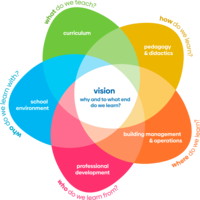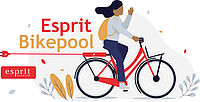Esprit Schools has its own Sustainability Plan to work towards achieving the Sustainable Development Goals. We opt for a broad, coherent approach, by paying attention to:
- what we learn - giving sustainability a permanent place in the curriculum;
- how we learn - pedagogy and didactics for socio-environmental sustainability;
- where we learn – aiming for climate-neutral buildings and circular operations;
- from whom we learn - professional development of employees and
- with whom we learn – connecting with our environment
In the years to come, we will do this by setting up a Sustainability Teachers Network, by encouraging students to form a green team and take initiatives in and around the school, and by working on a sustainable multi-annual investment plan for our school buildings, among other things. Through professionalization and by participating in networks, we emphasize development and cooperation. Not only is this challenging and fun, but our students demand it.
Pedagogy and didactics
By having our students participate in and by encouraging them to take sustainable action, schools make a didactic choice. We encourage this. Students at several Esprit schools are active members of eco/climate clubs, gay-straight alliances (social sustainability) and/or (green) student councils. Going outside is also a pedagogical/didactic choice. With school gardens, garden days and outdoor teachers or outdoor learning experts, we help students connect with the natural world around us.
Curriculum
Sustainability plays a different role in the different curricula of our schools. A few highlights are the fact that the Berlage Lyceum is the first secondary school in the Netherlands to teach the subject 'sustainability', that the AICS is an Eco School and Montessori School Landsmeer is in the process of being accredited as an Eco School. 40 Esprit teachers have already joined the Sustainability Teachers' Network, which seeks to strengthen the integration of sustainability in teaching curriculums.
Operations
In 2022, Esprit performed a carbon baseline measurement to map out its own carbon footprint. A carbon reduction plan will follow. Our purchasing policy has a section on sustainability, as we want our procurement practices to contribute to our sustainability ambitions, including in the field of personnel procurement. Sustainable employability makes up a separate section in our strategic HR policy.
Several Esprit schools have school canteens or offer food to students. Sustainability and food are intimately related. Some of our schools only serve vegetarian food, while other schools are working towards this goal. Other schools pay attention to food waste or do not allow their students to bring cartons or food wrapped in single-use plastic.
The Breikers Foundation has calculated that over 70% of Esprit employees could come to school by bike (electric or otherwise). This insight prompted us to set up the Esprit bike project with the aim of promoting sustainable mobility and health. In a bid to help employees build new routines, all Esprit schools purchased one or more electric bicycles last year, which the employees can borrow for a period of 6 weeks to commute.
Buildings
Since 2019, we have adopted the following principles for all our construction and furnishing projects : Circularity, inclusion of nature and energy neutrality. These principles played a leading role in:
- the construction of the new AICS South;
- the renovation of Berlage Lyceum;
- the playground of the Europaschool;
- the renovation of AICS South East;
- the new building of De Verwondering;
- the renovation and adaptation of the ALASCA building;
- the circular renovation of the facade of Mundus College;
- the extension and renovation of the interior of Spring High, ALASCA, Berlage Lyceum, TASC, AICS South and AICS South East.
Esprit has a large warehouse for school furniture such as tables, chairs and cupboards to ensure that furniture is not simply disposed of and can be reused again later instead of buying new furniture. Six of our schools are equipped with solar panels, with two more set to follow. In the coming year, we will work on equipping even more of our schools with solar panels. Five of our schools are already connected to district heating.
Professional development
We aim to offer courses or training to all Esprit teachers looking for tools to embed sustainability in their teaching. The Esprit Academy will offer 3 different sustainability courses the coming year. Sustainability is addressed during the Esprit leadership days, on study days and the ii&i day to foster joint in-depth efforts.
Environment
We are greening more and more of Esprit schoolyards. Nature inclusion played a major role in the design of the playground of the WSV and the Europaschool. Most schools want to foster a sustainable connection and social cohesion with the neighbourhood. Through outdoor lessons or subjects such as 'sustainability', students come into contact with the school’s surroundings. The schools have now started setting up sustainable networks, e.g. by taking part participation in the SustainaBul VO Educational Benchmark. In the field of buildings and operational management, Esprit participated in meetings of the “15% gas terug” action network.


